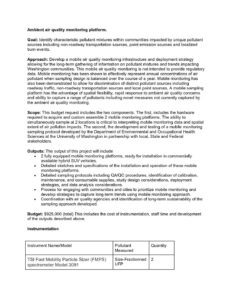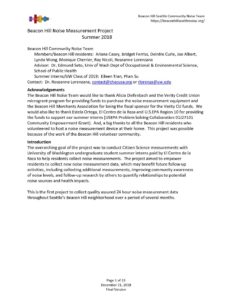Monitoring air quality in schools
January 27, 2021 | Deirdre Lockwood Does ultrafine air pollution infiltrate schools near Sea-Tac Airport? DEOHS researchers partner with cities in South King County to find out. DEOHS Assistant Professor Elena Austin is leading a project to track air quality in public schools near Sea-Tac Airport. Photo: Mark Stone. As students in King County public
UW DEOHS Ambient air quality monitoring platform

The Sea-Tac Airport Annual Air Quality Monitoring Proposal (STAAQM)
This post describes a proposal we have put forward to Washington State legislators Senator Karen Keiser (33rd) and Representative Jesse Johnson (30th). In one sentence, we want an annual report of all key aviation-related emissions for every neighborhood affected by the operations from Sea-Tac Airport. We refer to this proposal as Sea-Tac Airport Annual Air
Beacon Hill Air & Noise Pollution Community Meeting Zoom Video
2020 Washington State Senate Bill 6168 Sec. 603 (42) Indoor Air Quality Study
State Budget (SENATE BILL 6168, Sec. 603) (42) $50,000 of the general fund—state appropriation for fiscal year 2021 is provided solely for the department of environmental and occupational health sciences to provide an air quality report. The report will study the relationship between indoor and outdoor ultrafine particle air quality at sites with vulnerable populations,
What are they getting exposed to out there?
April 29, 2019 | Lynn Schnaiberg Research led by UW DEOHS measures air traffic pollution around Sea-Tac Airport to understand potential health effects on nearby communities UW DEOHS leads the first study to systematically track aircraft-related air pollution in the communities around Seattle-Tacaoma International Airport. Photo: Don Wilson, Port of Seattle. JC Harris lives on
Beacon Hill Noise Project 2018 Rpt

2017 Washington State Senate Bill 6032 Sec. 602 (19) MOV-UP Study
“$125,000 of the general fund—state appropriation for fiscal year 2018 and $125,000 of the general fund—state appropriation for fiscal year 2019 are provided solely for the University of Washington school of public health to study the air quality implications of air traffic at the international airport in the state that has the highest total annual